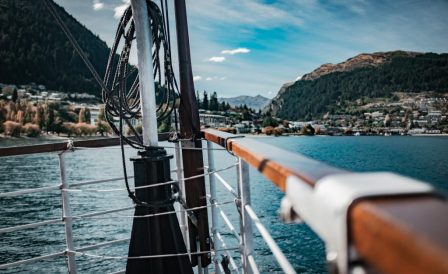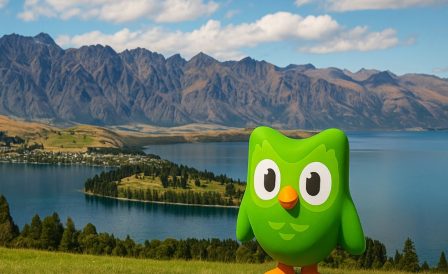Why is everyone suddenly talking about a crisis in New Zealand? Is it true that people are leaving en masse? Is there no work left in the country? Is the grass greener in Australia?
Let’s break it down in detail.
Lately, I’ve noticed how various media outlets and influencers are trying to capitalize on the problems we have here. Newspaper headlines scream: “New Zealand is broken and you’re a fool if you stay” — only to contradict themselves later. This kind of content gets spread both by people connected to the country and by those with no relation to it at all.
Over the past 12 months, 73,000 New Zealand citizens have left the country. That’s about 1.4% of the total population, and 9% more departures than the year before. At the same time, around 26,000 citizens returned, which is 16% more than the previous year. The net result: just over 47,000 fewer citizens.
Meanwhile, 54,000 non-citizens left the country — 21% more than the year before. But 115,000 arrived, even though that number was down 25% compared to the previous year.
All in all: nearly 61,000 more non-citizens, and a net migration gain of 13,000 people.
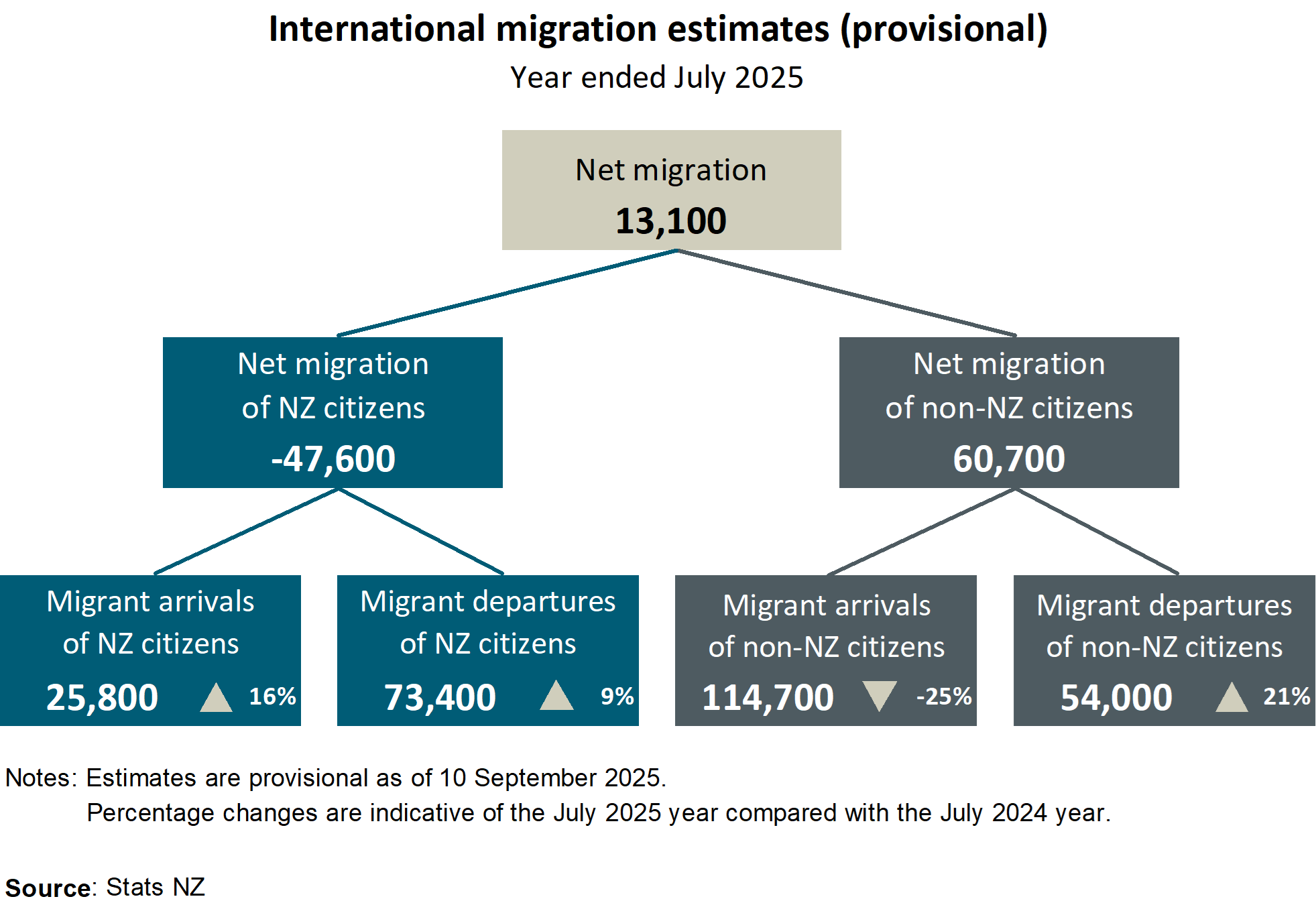
A catastrophe? Lines at the airport, everyone rushing to leave? Of course not. Let’s take a look at the graph and break down the details:
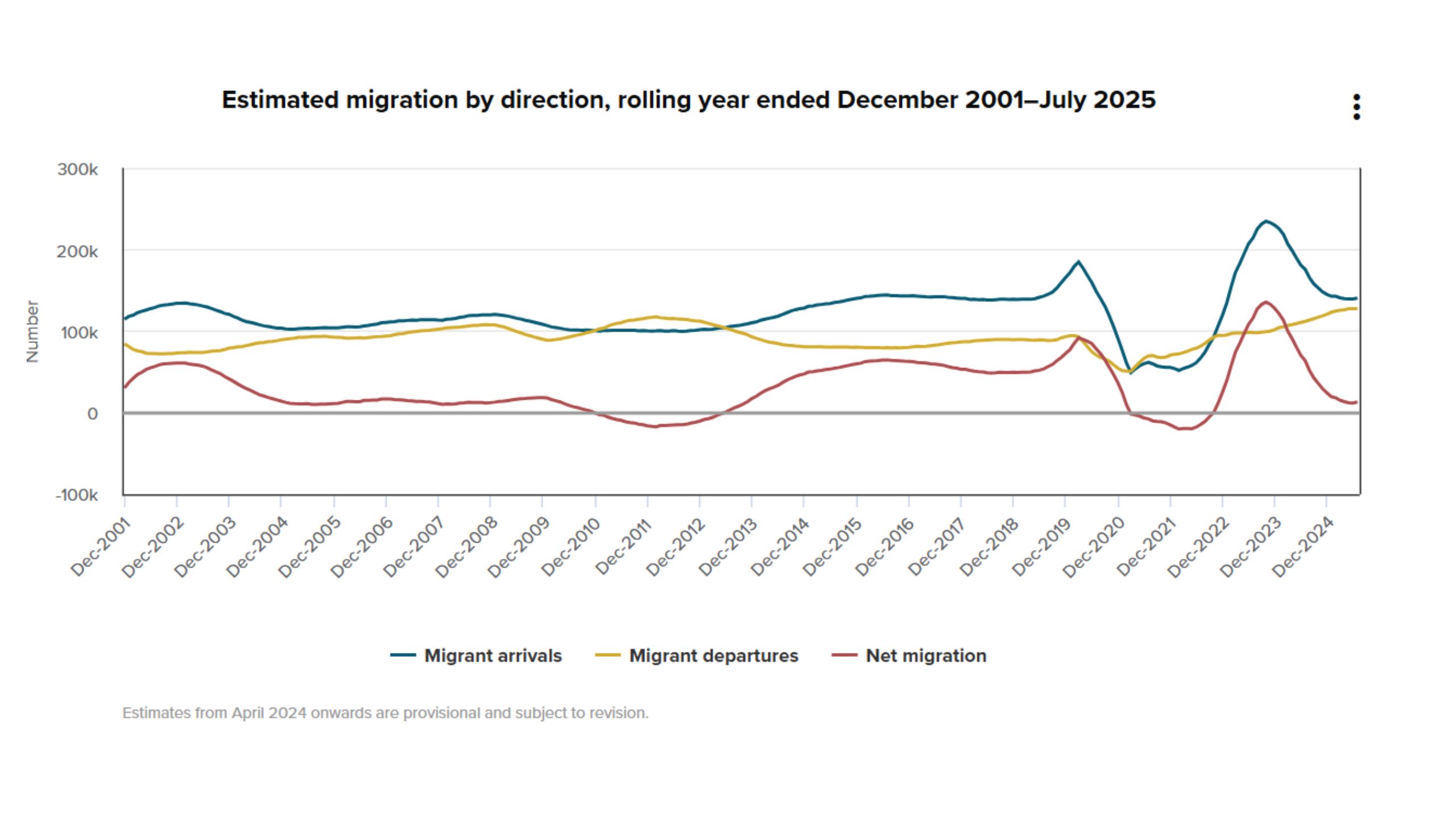
-
- Between 2013 and 2017 there was steady growth in arrivals, followed by the first record peak in 2018–2019.
- Then came a three-year slump due to border closures during the pandemic. At that time, many New Zealanders returned home, setting historic records, while non-citizens left since they couldn’t bring their families. During the pandemic years, a backlog of people wanting to move built up. As a result, 2023 saw a new all-time record for migration to New Zealand.
- So what’s been happening in the last two years? And why do we keep hearing hysterical claims that people no longer want to live here?
- First, about the drop in arrivals. People are comparing it with the record set the year before, which was the result of three years of closed borders. But looking at the year-by-year graph, the numbers have simply returned to the high, stable levels of the pre-2019 period — actually even a bit higher. In other words, people are still coming here quite willingly.
- Now, about departures. Yes, more people are leaving than usual. But for New Zealanders, it has always been normal to go live in Australia or elsewhere — often not out of necessity, but simply because they can. Many migrants also come first to New Zealand and then move on, often deliberately, because getting a New Zealand passport is easier.Moreover, after several years of steady growth and then a peak in foreign arrivals by 2019, many of those migrants have since obtained citizenship. Now, when they leave, they are counted as New Zealand citizens. The growth in departures is just 9% compared to last year’s figure. Over the past decade, around 42,000 departures per year was the norm. So it’s not surprising that with all the new passports issued in recent years, the number has risen to 73,000.
Moreover, new spikes in departures are still ahead. In 2021–2022, the previous New Zealand government, having badly mishandled the immigration system, decided to clear the backlog with a kind of “residency amnesty.”
Permanent resident status was granted to almost everyone who happened to be working in the country during the pandemic period. Starting in 2026 and for another two to three years, many of these people will also be eligible to leave with New Zealand passports for Australia or elsewhere. And in their place, new arrivals will come. It’s the cycle of migration in New Zealand.
However, it’s important to understand: it is a minority who leave, while the majority settle in successfully and continue living here.
Some people claim that it’s young, successful professionals who are leaving, only to be replaced by low-skilled, low-paid workers. That is, of course, not true.
A basic look at New Zealand’s immigration rules is enough to understand how difficult it is to get in, and how challenging it is to obtain a work visa. Staying here is possible only for the qualified professionals, including young ones, who can secure a visa through study or employer sponsorship. This is New Zealand’s systemic filter, and it works.
Job Market
Unemployment in August 2025 reached 5.2% — the highest level in the past five years.
However, it’s worth noting that even this is still relatively low by international standards, which is typical for New Zealand. The rate is currently a bit higher than in Australia or the US, but lower than in Canada and most European countries.
Main reasons:
- Overall global economic instability
- The impact of AI and automation
- Layoffs and outsourcing to lower-cost countries
- Global conflicts
Everything plays a role. And small, remote New Zealand inevitably feels the impact as well. Yes, it has become harder to find a job, and competition has increased. But to claim that “there are no jobs at all” would be wrong.
I’ve heard from friends about layoffs, and of course, everyone knows someone who has been affected. Our brains tend to focus on these stories first. Is it true that there are fewer jobs and more job seekers on the market? Absolutely — the facts and statistics confirm it. But does this mean there is no work at all? Definitely not. It just means it’s harder to compete and takes longer to land a job. You have to put in more effort.
Out of curiosity, we ran a survey in one immigrant chat to see how people’s work situations have been over the past year (this survey was conducted among Russian immigrants, so the chart is in Russian — but we’ll provide an explanation below):

3% lost their jobs but found new ones Another 3% lost their jobs and haven’t found anything yet39% kept their jobs as before19% changed jobs on their own initiativeand 36% are still looking for their very first job in New Zealand.
Are things with employment better elsewhere? Certainly. New Zealand is home to just over 5 million people, which brings both its advantages and disadvantages.
Economy
Here are some key indicators and recent updates:
- New Zealand’s GDP — the measure of the total value of goods and services produced in the country — fell by 1.1% over the past year, signaling an economic downturn. Companies are producing less, and people are spending less.
- At the same time, wages have grown by 4.5%, while inflation has slowed to 2.7%.
- A longer-term chart shows how sharply the ratio of housing costs to wages has risen over the last 50 years. As elsewhere in the world, owning a home has become increasingly difficult. Many still manage, but the global trend is far from encouraging
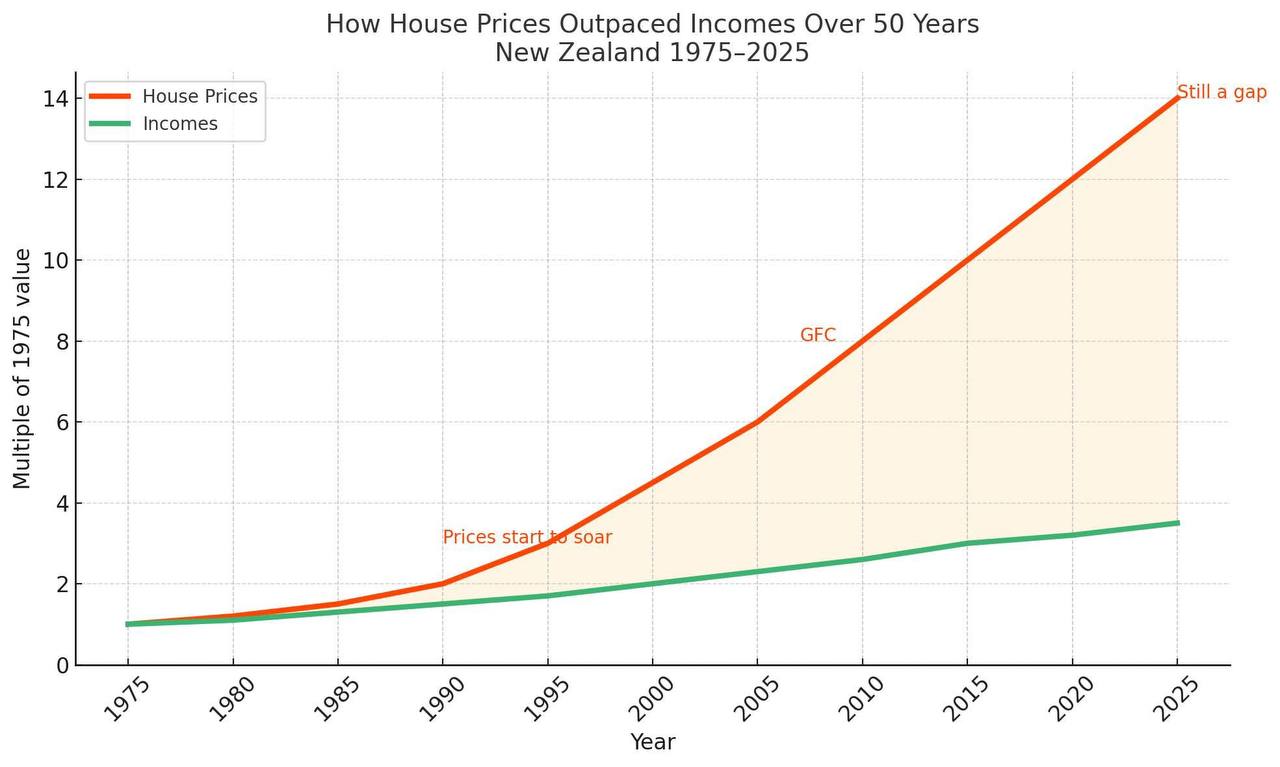
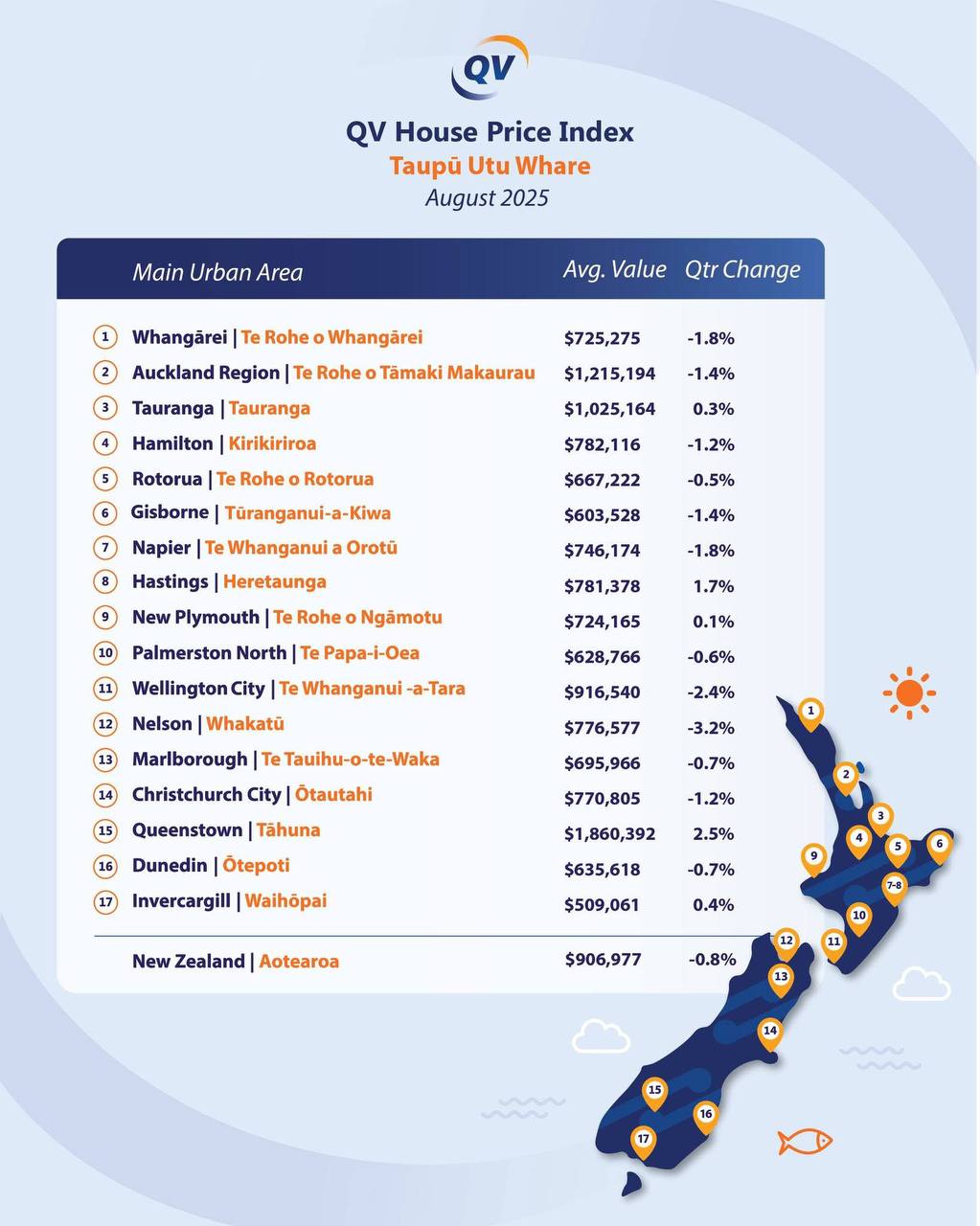
By the way, housing prices in New Zealand have actually stabilized over the past two years.
The average house price is NZ$907,000 — almost 1% lower than 12 months ago.
• In Auckland it’s NZ$1.215 million
• In Wellington NZ$916,000
• And in Christchurch NZ$707,00.
Let me add a bit of subjective personal opinion. In my view, we are still paying the price for the decisions made during the pandemic.
It’s impossible for a country to recover quickly after being closed for nearly three years, which killed many businesses and battered entire industries. Recovery is happening — in tourism, in education, and in many other sectors, but the aftereffects will linger for several more years.
And of course, global events aren’t making things any easier. As I mentioned earlier: wars, market shifts, sanctions, tariffs — all of this affects people’s lives. We feel less stability and more uncertainty. In some ways, being far away from many of the world’s problems is actually an advantage for New Zealand. But economically, we depend on everyone else, and inevitably that adds its own challenges.
Politics
People usually place their hopes for solving problems not on themselves, but on someone else — for example, the government.
Here’s an example of what I consider not only unprofessional work, but outright sabotage, because it does no good for people, stirs up emotional irritation, and creates misleading impressions.
A quote from one so-called journalist:
“Most importantly, no one believes this government is capable of solving the problems. Honestly, it feels like the Prime Minister is already planning to leave the country. You can see the dreamy, distant look in his eyes when he boards a plane. That’s the look of a man already thinking about his international career. If he stays in New Zealand after his term, you can paint me blue and call me the Queen of the Smurfs.”
That’s the level of journalism these days. I’ve long noticed that some media outlets lean heavily to one side. Back when they glorified a highly questionable former leader for his supposed and frankly absurd “achievements.” And now they relish the chance to pour venom on the current government.
At this point, the new coalition has been in power for two years. Most of that time has been spent shutting down and dismantling projects launched by the previous government, which they deemed unviable — to put it mildly. Many unpopular decisions have been made, and many jobs have been cut.
That said, there’s still one year left until the next election. And something tells me this is when they’ll start pulling aces from their sleeve — if they have any. They need to regain lost popularity. For example, they’ve already announced NZ$6 billion in investments for construction. There’s hope this will revive the struggling industry. We’ll see what happens next.
Personally, I think three years is a very short time. It’s genuinely difficult to achieve meaningful results in a slow-moving bureaucratic state machine. I’m not ready to make predictions yet, nor to decide whether the current government is good or bad. But one thing is certain — I definitely didn’t like the previous one. We’ll see what comes next.
Australia. Better? Worse? Why Do People Move?
It’s a classic topic: New Zealanders moving to Australia. And it has always been this way. With a New Zealand passport, you can live and work freely across the Tasman. Right now, around 700,000 New Zealanders reside in Australia — about 13% of New Zealand’s own population.
The main reasons for moving are: the hotter climate that some prefer, broader career opportunities in a larger country, in some cases a better income-to-expense ratio, and more options for social and leisure activities, especially for young people.
Immigrants often use New Zealand as a stepping stone to Australia, because moving there directly is much harder. There may indeed be more jobs in Australia overall, but securing one from abroad is extremely difficult. Employers usually want to see people already holding a work visa. Getting that visa through study is simpler, faster, and cheaper in New Zealand. Especially after Australia scrapped post-study work visas for graduates over 35. A relatively small percentage eventually gain New Zealand citizenship and then move on to Australia. It seems to work out well for both countries.
Of course, the comments are divided. Some say: “Time to move to Australia — more jobs, higher incomes, lower costs.” Others, often under the same sensationalist articles, disagree: “We just came back from Australia, and it’s not better. Food and utilities are going up, healthcare is the same, housing is hard to find, crime is worse, and taxes are higher.”
Once again, I’d like to stress: personal stories can be interesting, but they don’t always reflect the full picture. It’s the numbers and data that matter.

At one point, many New Zealanders and immigrants who had obtained passports were moving particularly to Brisbane — since it was cheaper than Sydney or Melbourne. They often compared it with Auckland and found Australian living costs to be lower. Those days, however, seem to be over. Both personal experiences and data now show that Brisbane is no longer cheaper than Auckland when you add up the overall cost of living.
To be fair, salaries can indeed be higher in Australia — but not everywhere and not for every profession. On average, specialists in Australia may earn between 0 and 30% more.
- You can see a comparison of salaries in different industries in this guide
Another interesting point: among those moving from New Zealand to Australia, there are relatively few who were laid off or couldn’t find work here. More often, people voluntarily leave their jobs and head off to try themselves elsewhere, freeing up positions for others. And so the cycle of migration continues in the Australo-New Zealand ecosystem.
And as for the grass — it really is greener in New Zealand. That’s a natural and obvious fact. 🌱
Forecasts and Plans for Improving Immigration Conditions
It’s difficult to make predictions in today’s unstable world. Even in once-stable New Zealand, it’s not easy. Still, the country remains among the top-ranked places to live in numerous global ratings.
For example, it is considered one of the safest places on the planet:
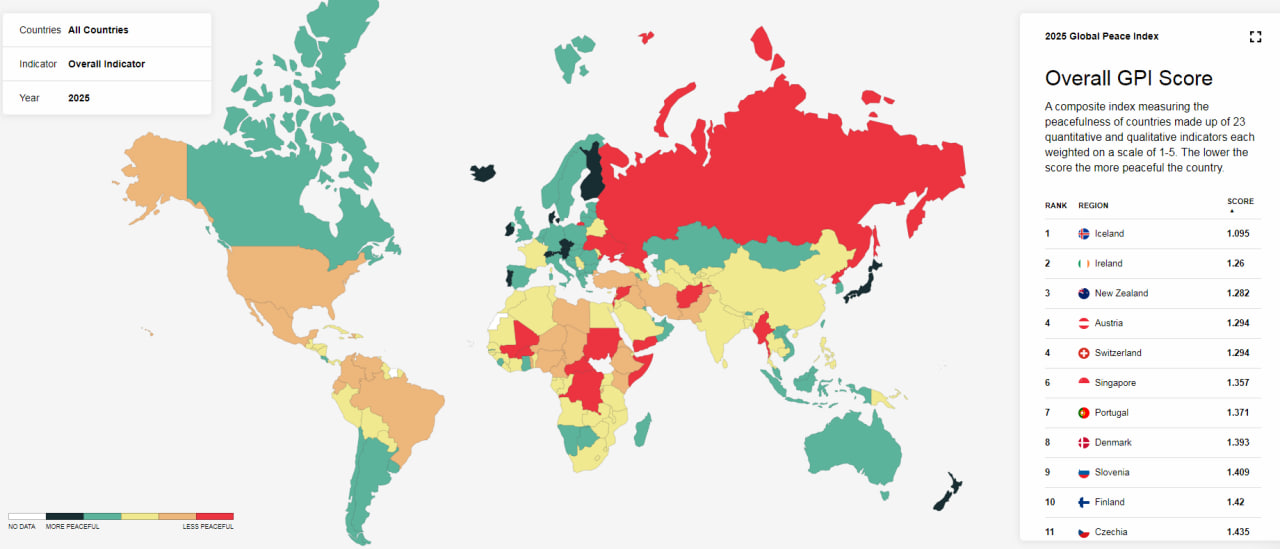
Yes, there are problems here, that’s obvious. But everything in this world is relative. Tell me, where today do you see growth, stability, safety, and prosperity, with none of the issues I’ve just described?
We’ve grown used to high standards, and we judge our country against them — and that’s a good thing. Problems need to be acknowledged. And addressed. So that life becomes better for you and for those you care about.
By the way, the government recently announced plans to improve residency conditions for skilled and experienced immigrants. After just a year and a half to two years of working in New Zealand, it will be possible to apply for a resident visa. This shows they understand the country will continue to need qualified professionals. And the cycle will go on.
Those who complain and lament are always heard louder.
When things are going well, people are less inclined to share it, they don’t spend time posting about it on social media. They work, earn money, spend time with family and friends, and enjoy their hobbies. But negative content spreads more easily, and that’s why it often dominates the picture.
Still, we need to keep a cool head. When you read the news or hear someone’s opinion — including mine — switch on your brain, analyze, and think for yourself. Adults make their own decisions about their future.
Immigration is difficult, and it’s not for everyone. New Zealand isn’t the right fit for everyone either. Our job is to talk about both the bad and the good. Subscribe to our channels, and see you — hopefully — in New Zealand!
Dennis Vlasin, founder of Kiwi Education


